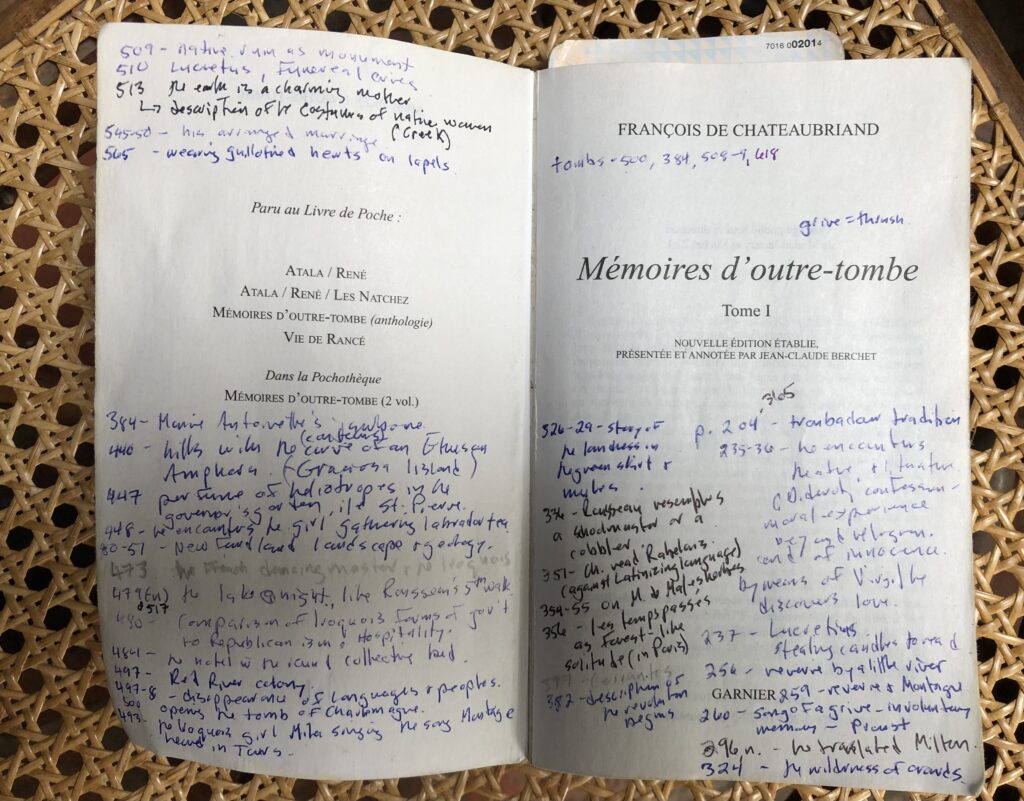
Horned adder. Marius Burger, via Wikimedia Commons.
I lie in bed until the voice says Get up and live, then I put on my slippers and read my usual ten pages of Chateaubriand over breakfast. Why Chateaubriand? Because it is an impossibly long book, and long out of fashion, because Baudelaire claimed him, in a letter to Sainte-Beuve, as the father of dandyism, because Proust heard in Chateaubriand’s style the fragile echoing call of an owl in the woods at night, because the book I want to write seems to me as impossible. My spiritual fidelity is to the school of lapsed fashions. It is Chateaubriand’s tomb that I discover in my halting French—his memoirs from beyond the tomb, published posthumously, which I bought in four fat pocketbook volumes, inexpensive but with well-glued bindings and thorough footnotes, in a bookshop on the Rue de Bretagne. I now believe I turned up that street in unconscious attraction to its name: Chateaubriand’s birthplace is Saint-Malo, Brittany. The evocative mystery of a name means everything to him, as it did to Proust—a name, like a two-note birdcall from the woods, is the smallest signature of style.
I compile an undisciplined index on the flyleaf of the first volume as I read it, as a future aid to memory but also for the private pleasure of watching this crooked list accrue in its variously colored inks. On page 336 he haughtily refers to Rousseau as a kind of cobbler or a schoolmaster. His praise for Lord Byron receives an entire chapter in the twelfth book. As a boy he learns about love from the Latin poets: he voluptuously reads Lucretius in bed at night, by the light of stolen candles, and I think of Lucy Hutchinson’s 1653 English translation of the then-forbidden De rerum natura, in which she describes how a lad’s nocturnal emission “wett / the shining Babylonian coverlett.” Chateaubriand’s own boyhood coverlet was almost certainly of coarse manufacture; his father’s version of domestic economy in their moldering château was Spartan, inadvertently preparing the writer for his future exile and penury. An aficionado of exile, four times he mentions the troubadours in the first volume. Of all the items I have noted in my index, the one with the most entries is tomb. This shouldn’t surprise: everyone dies. Entire languages violently disappear. There’s not a place on earth, he says, that’s tombless. It is to him the most fascinating subject. He sees America, where he traveled at length during the Terror of the French Revolution, as nothing but the tomb of the great Indigenous nations reduced to ruin by Europe. On page 493, he describes how at Niagara Falls he heard an Iroquois girl named Mila sing a song about the beautiful pattern of the adder’s skin; as she sings, he realizes that he already knows the song, which was recorded, he says, in an essay by Montaigne, who had heard a different Iroquois girl sing it two centuries before in Rouen. I am enchanted by this incredible story, so I look further, and learn the adder song has a spurious linkage. The girl at Niagara Falls could not have sung the song cited by Montaigne, who writes in his 1580 account “Of Cannibals” that it was sung by a captive Tupinambá girl from Brazil, in the Tupi language. So am I to believe Chateaubriand when he says that he has handled the decomposed skull of Marie Antoinette? It is he who identified the remains of the guillotined queen, he claims, which had been thrown perfunctorily into a collective pit. He knew her, he says, by means of the set of the teeth in the jawbone; at Versailles, in his youth, he had been familiar with the Queen’s wide smile.
In July of 1791, alone in the forest near Albany, seeking, as he explained, the Northwest Passage, and believing himself to be in a primordial embrace with Nature, Chateaubriand heard the sound of a fiddle in the woods. He approached the surprising music to discover in a clearing a French dancing master in a powdered wig, apple-green suit, and lace jabot and cuffs, playing a tune for a group of twenty bare-torsoed, feather-wearing, dancing Iroquois men. These were the first Indigenous people the young exile had ever met. The fiddler’s tune, “Madelon Friquet,” had been a popular French fairground song. French dancing masters were then common in America, the notes inform me, having been displaced and there being no further call for them during the revolution. A faintly comedic melancholy is this book’s mother tongue.
Chateaubriand says that the pleasures of youth revisited in memory are ruins seen by torchlight. I don’t know whether I’m the ruin or the torch.
Montaigne was dead at fifty-nine—kidneys; Baudelaire at forty-six—syphilis, probably. Rousseau died at sixty-six of causes unconnected to his lifelong urethral malformation, described so exhaustively and enticingly by Starobinski; Lord Byron died of fever at the age of thirty-six in the Greek War of Independence in 1824, the year of Baudelaire’s birth. After a final visit to his mistress, Madame Récamier, he by then blind and she paralytic, Chateaubriand died at the age of seventy-nine, in 1848, the year of the third revolution and its failure and of Baudelaire’s grand political disillusionment.
The attribution of causation to human behavior is generally a work of fantasy. Birds will speak the last human words, Chateaubriand says. Each one of us is the last witness of something—some custom, habit, way of speaking, economy, some lapsed mode of life. He says only style survives.

You can read an excerpt from the first volume of Chateaubriand’s memoirs online here, and an excerpt from the recently published second volume here.
Lisa Robertson is the translator of “Pos de chantar m’es pres talenz,” a poem by William IX of Aquitaine in our Winter 2022 issue. Her most recent book of poetry is Boat.
from The Paris Review https://ift.tt/RjxvOKP
Comments
Post a Comment